Mack The Knife
Mack The Knife
Murder ballads are a sub-genre of the traditional ballad form, the lyrics of which form a narrative describing the events of a murder, often including the lead-up and/or aftermath. A medieval version of the murder ballad performed by strolling minstrels was A moritat (from mori meaning "deadly" and tat meaning "deed").
Mack The Knife
"Mack the Knife" or "The Ballad of Mack the Knife", originally "Das Moritat von Mackie Messer", is a song composed by Kurt Weill with lyrics by Bertolt Brecht for their music drama Die Dreigroschenoper, or, as it is known in English, The Threepenny Opera.

John Gay
In The Threepenny Opera, the moritat singer with his street organ introduces and closes the drama with the tale of the deadly Mackie Messer, or Mack the Knife, a character based on the dashing highwayman Macheath in John Gay's The Beggar's Opera. The Brecht-Weill version of the character was far more cruel and sinister, and has been transformed into a modern anti-hero.
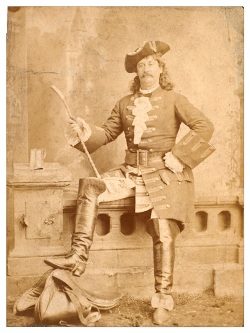
Macheath from The Beggar's Opera
Kurt Julian Weill (March 2, 1900 – April 3, 1950) was a German-Jewish composer, active from the 1920s, and in his later years in the United States. He was a leading composer for the stage who was best known for his fruitful collaborations with Bertolt Brecht. Weill was a socialist who held the ideal of writing music that served a socially useful purpose.

Kurt Weill
He wrote a number of works for the concert hall, as well as several Judaism themed pieces. Apart from "Mack the Knife" and "Pirate Jenny" from the Threepenny Opera, his most famous songs include "Alabama Song" (from Mahagonny), "Surabaya Johnny" (from Happy End), "Speak Low" (from One Touch of Venus), "Lost in the Stars" (from the musical of that name), "My Ship" (from Lady in the Dark), and "September Song" (from Knickerbocker Holiday).
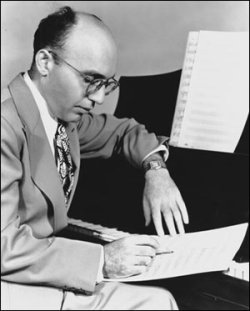
Kurt Weill
Bertolt Brecht (10 February 1898 – 14 August 1956) was a German poet, playwright, and theatre director. An influential theatre practitioner of the 20th century, Brecht made equally significant contributions to dramaturgy and theatrical production, the latter particularly through the seismic impact of the tours undertaken by the Berliner Ensemble—the post-war theatre company operated by Brecht and his wife, long-time collaborator, and actress Helene Weigel.

Bertold Brecht
Along with his contemporary Erwin Piscator, Brecht created an influential theory of theatre—the epic theatre—that proposed that a play should not cause the spectator to identify emotionally with the characters or action before him or her, but should instead provoke rational self-reflection and a critical view of the action on the stage. For this purpose, Brecht employed the use of techniques that remind the spectator that the play is a representation of reality and not reality itself.

Bertold Brecht
The Threepenny Opera premiered in Berlin in 1928 at the Theater am Schiffbauerdamm. The Moritat was sung by Kurt Gerron, who was a noted film and stage actor in Germany, and who also played the part of the Police Chief Brown. Weill also intended for the Moritat to be accompanied by a barrel organ, which was to be played by the singer.
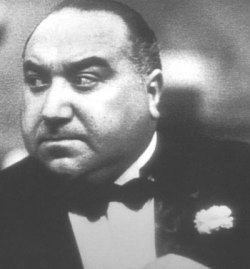
Kurt Gerron
"Mack the Knife" was first introduced to American audiences in the first English-language production of The Threepenny Opera, which played on Broadway in 1933. The English lyrics were by Gifford Cochran and Jerrold Krimsky. However, that production was a complete flop and the song did not catch on.

Mack The Knife
The song was introduced to the United States hit parade by Louis Armstrong in 1956, but the song is most closely associated with Bobby Darin, who recorded his version at Fulton Studios on West 40th Street, New York City, on December 19, 1958. In 1959 Darin's version reached number one on the Billboard Hot 100 and number six on the Black Singles chart, and earned him a Grammy Award for Record of the Year.
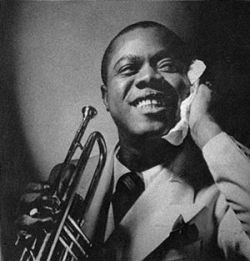
Louis Armstrong
This song remained at No. 1 for nine weeks. Became #1 on 10-05-1959 for six weeks then "Mr. Blue" by The Fleetwoods became #1 for one week and Bobby reclaimed #1 for next three weeks. This was a US Top 40 hit for 7 different artists: The Dick Hyman Trio, Richard Hayman and Jan August, Lawrence Welk, Louis Armstrong, Billy Vaughn, Darin, and Ella Fitzgerald.
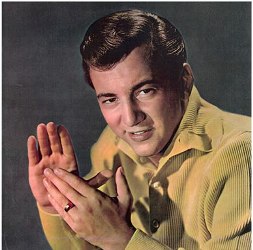
Bobby Darin
The best known English translation popularized by Louis Armstrong (1956) and Bobby Darin (1959) is from the Marc Blitzstein 1954 version of “The Threepenny Opera”, which played Off-Broadway for well over six years.
The song attributes many crimes to Macheath:
A dead man in London, on the Strand
A rich man, Schmul Meier, disappeared for good and possibly robbed
Jenny Towler, killed with a knife in the chest
A cabbie, Alfred Gleet, missing and presumed dead
Seven children and an old man killed in an arson fire
Rape of an underage widow (minderjährige Witwe) in her bed
The arson, rape and disappearance of the cabbie were omitted from the original cast recording of the Blitzstein version, but remain intact in the libretto.
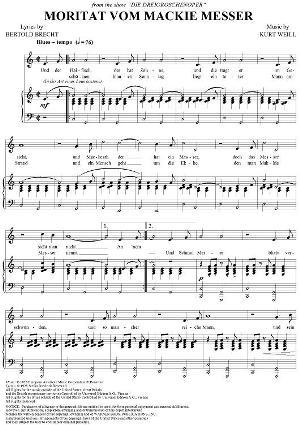
Moritat from The Threepenny Opera
Die Moritat von Mackie Messer (Original german version)
Und der Haifisch, der hat Zähne Und die trägt er im Gesicht Und Macheath, der hat ein Messer Doch das Messer sieht man nicht. Und es sind des Haifischs Flossen Rot, wenn dieser Blut vergiesst Mackie Messer trägt'nen Handschuh Drauf man keine Untat liest. An der Themse grünem Wasser Fallen plötzlich Leute um Es ist weder Pest noch Cholera Doch es heisst: Mackie geht um. An'nem schönen blauen Sonntag Liegt ein toter Mann am Strand Und ein Mensch geht um die Ecke Den man Mackie Messer nennt. Und Schmul Meier bleibt verschwunden Und so mancher reiche Mann Und sein Geld hat Mackie Messer Dem man nichts beweisen kann. Jenny Towler ward gefunden Mit'nem Messer in der Brust Und am Kai geht Mackie Messer Der von allem nichts gewusst. Wo ist Alfons gleich, der Fuhrherr? Kommt das je ans Sonnenlicht? Wer es immer wissen könnte Mackie Messer weiss es nicht. Und das grosse Feuer in Soho Sieben Kinder und ein Greis In der Menge Mackie Messer, den Man nicht fragt, und der nichts weiss. Und die minderjähr'ge Witwe Deren Namen jeder weiss Wachte auf und war geschändet Mackie welches war dein Preis?
Mack The Knife Words by Marc Blitzstein
Oh, the shark, babe, has such teeth, dear And it shows them pearly white Just a jackknife has old MacHeath, babe And he keeps it … ah … out of sight. Ya know when that shark bites, with his teeth, babe Scarlet billows start to spread Fancy gloves, though, wears old MacHeath, babe So there’s nevah, nevah a trace of red. Now on the sidewalk … uuh, huh … whoo … sunny mornin’ … uuh, huh Lies a body just oozin' life … eeek! And someone’s sneakin' ‘round the corner Could that someone be Mack the Knife? A-there's a tugboat … huh, huh, huh … down by the river don’tcha know Where a cement bag’s just a'droopin' on down Oh, that cement is just, it's there for the weight, dear Five'll get ya ten old Macky’s back in town. Now, d'ja hear ‘bout Louie Miller? He disappeared, babe After drawin' out all his hard-earned cash And now MacHeath spends just like a sailor Could it be our boy's done somethin' rash? Now … Jenny Diver … ho, ho … yeah … Sukey Tawdry Ooh … Miss Lotte Lenya and old Lucy Brown Oh, the line forms on the right, babe Now that Macky’s back in town. Aah … I said Jenny Diver … whoa … Sukey Tawdry Look out to Miss Lotte Lenya and old Lucy Brown Yes, that line forms on the right, babe Now that Macky’s back in town … Look out … old Macky is back!!
Lotte Lenya whose name appears late in the song is, in fact, a real person -- she was an Austrian-born singer and actress with a lucrative career in the years between the world wars, and on Broadway following WWII. Fans of Broadway productions probably already knew her quite well; but even if you're not a theater-goer, you've probably seen her, without know it -- she played bad-gal Rosa Kleb in the James Bond movie "From Russia With Love" who tries to kill 007 by kicking him with her shoe/knife.
Last Updated (Tuesday, 17 March 2015 14:39)








